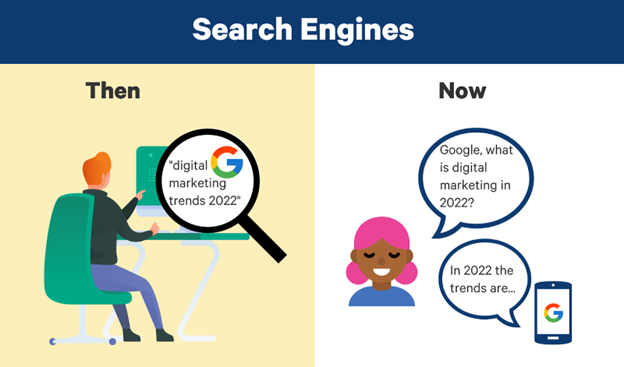SHARE

Search engine marketing (SEM) has become essential to any successful online marketing campaign. With ever-increasing competition, businesses are constantly looking for ways to stay ahead in the digital space. Thankfully, technological advances have brought us artificial intelligence (AI), a powerful tool that can revolutionise SEM and take it to new heights.
[thrive_leads id=’8271′]
Understanding the Role of AI in Search Engine Marketing
AI is not just a buzzword – it’s a game-changer. To grasp the potential of AI in search engine marketing, it’s imperative to understand its basics and how it is disrupting the industry. AI refers to machines that can simulate human intelligence and perform tasks without explicit instructions. In the context of SEM, AI algorithms can analyse vast amounts of data, learn patterns, and make predictions, enabling marketers to refine their strategies and achieve better results.
Artificial Intelligence has become an integral part of our lives, revolutionising various industries, and search engine marketing is no exception. With its ability to process and analyse massive amounts of data, AI transforms how marketers approach their campaigns.
By leveraging AI-powered tools, businesses can streamline their keyword research, ad targeting, and content creation processes, saving valuable time and resources. This allows marketers to focus more on strategic decision-making, ensuring their campaigns are optimised for success.
The Basics of AI and Search Engine Marketing
AI-powered tools can help marketers streamline their keyword research, ad targeting, and content creation processes. By leveraging AI technology, businesses can save time and resources, allowing them to focus more on strategic decision-making. When it comes to search engine marketing, AI algorithms play a crucial role in analysing and understanding user behaviour.
By studying patterns and trends, AI-powered systems can identify the keywords and phrases that are most relevant to a particular target audience. This enables marketers to create highly targeted campaigns that resonate with their intended audience, increasing the chances of conversion and success. Furthermore, AI can assist in optimising ad targeting by analysing user preferences and behaviour. By understanding individual users’ interests and preferences, AI algorithms can deliver ads more likely to capture their attention and drive engagement. This level of personalisation enhances the user experience and increases the effectiveness of marketing campaigns.
How AI is Revolutionising Search Engine Marketing
AI is changing the way search engine marketing operates. Machine learning algorithms can analyse user behaviour and preferences, allowing marketers to target their audience more effectively and providing valuable insights into customer intent. Consequently, businesses can create more personalised and relevant user experiences, increasing engagement and conversions.
AI is revolutionising search engine marketing through its ability to understand and predict user intent. By analysing search queries, browsing behaviour, and past interactions, AI algorithms can determine the underlying intent behind a user’s search. This enables marketers to tailor their content and ads to match their target audience’s specific needs and interests, increasing the chances of conversion and customer satisfaction.
Moreover, AI-powered tools can continuously learn and adapt to changing trends and user preferences. This means that marketers can stay ahead of the curve by constantly refining their strategies based on real-time data and insights. By leveraging AI, businesses can gain a competitive edge in the ever-evolving landscape of search engine marketing.
AI has revolutionised search engine marketing by providing marketers with powerful tools to analyse data, understand user behaviour, and optimise their campaigns. By leveraging AI technology, businesses can streamline their processes, target their audience more effectively, and create personalised experiences that drive engagement and conversions. As AI continues to evolve, its impact on search engine marketing will only grow, shaping the future of the industry.
The Benefits of using AI in Search Engine Marketing
Implementing AI in your search engine marketing strategy comes with several advantages that can give your business a competitive edge. Let’s explore a couple of significant benefits:
Improving Keyword Optimisation with AI
Keywords are the cornerstone of any successful SEM campaign. With AI-powered tools, marketers can go beyond basic keyword research. AI algorithms can identify keyword trends, analyse competitor strategies, and even recommend long-tail keywords that have high conversion potential. By leveraging AI for keyword optimisation, businesses can attract highly targeted traffic to their websites and drive more conversions.
Furthermore, AI can assist in identifying semantic relationships between keywords, allowing marketers to create more comprehensive and relevant content. This not only improves search engine rankings but also enhances the overall user experience on the website. By incorporating AI into keyword optimisation, businesses can stay ahead of the competition and ensure their content resonates with their target audience.
Enhancing user Experience Through AI
User experience (UX) is a critical factor in determining the success of a website. AI-powered chatbots, for example, can provide instant and personalised customer support, eliminating the need for users to wait for assistance. These chatbots can intelligently understand user queries and provide relevant information or solutions, enhancing customer satisfaction and reducing response time.
Moreover, AI algorithms can analyse user behaviour and provide dynamic content recommendations, making websites more engaging and interactive. By understanding user preferences, AI can suggest related products, articles, or services that align with the user’s interests. This personalised approach not only improves the user experience but also increases the likelihood of conversions and repeat visits.
Additionally, AI can help businesses identify and resolve UX issues by analysing user feedback and behaviour. By understanding pain points and areas of improvement, businesses can make data-driven decisions to enhance their website’s usability and overall user experience.
Incorporating AI into search engine marketing offers numerous benefits. From improving keyword optimisation to enhancing user experience, businesses can leverage AI-powered tools and algorithms to gain a competitive edge in the digital landscape. By staying up-to-date with the latest advancements in AI technology, businesses can continuously refine their marketing strategies and drive better results.
The Future of AI in Search Engine Marketing
AI has already made significant strides in search engine marketing, but its potential is far from exhausted. As technology continues to evolve, it’s crucial for marketers to stay ahead of the curve and be prepared for what the future holds.
One fascinating aspect of AI in search engine marketing is its ability to analyse vast amounts of data in real-time. This means that marketers can gain valuable insights into customer behaviour and preferences, allowing them to tailor their marketing strategies accordingly. For example, AI algorithms can analyse search patterns and identify trends, helping marketers understand what customers are looking for and how to effectively target them.
Another exciting development in AI and search engine marketing is the use of machine learning algorithms. These algorithms can learn from past data and make predictions about future outcomes. This enables marketers to anticipate customer needs and deliver personalised recommendations in real-time, creating a seamless and tailored customer experience.
Predicted Trends in AI and Search Engine Marketing
Experts predict that AI will continue to shape the future of search engine marketing. Natural language processing (NLP) algorithms, for instance, will enable more sophisticated voice search capabilities, requiring marketers to optimise their content accordingly. With the rise of voice assistants like Siri and Alexa, voice search is becoming increasingly popular, and AI will play a crucial role in improving its accuracy and effectiveness.
Furthermore, AI-powered predictive analysis will allow marketers to anticipate customer needs and deliver tailored recommendations in real-time, enhancing the overall customer journey. By analysing customer behaviour, preferences, and purchase history, AI algorithms can predict what products or services a customer is likely to be interested in, and present them with relevant recommendations at the right time.
Additionally, AI can help marketers identify and target specific audience segments more effectively. By analysing demographic data, browsing behaviour, and social media interactions, AI algorithms can identify patterns and preferences that can be used to create highly targeted marketing campaigns. This level of precision can significantly improve the return on investment for marketing efforts.
Preparing for An AI-Driven Future in Search Engine Marketing
With the rapid advancements in AI technology, it’s crucial for businesses to embrace this transformative force and adapt their marketing strategies accordingly. Staying informed about AI trends, investing in AI-powered tools, and continuously refining strategies based on data-driven insights are essential steps businesses can take to thrive in an AI-driven future.
Moreover, it is important for marketers to understand the ethical considerations surrounding AI in search engine marketing. As AI algorithms become more sophisticated, there is a need for transparency and accountability in how they are used. Marketers should ensure that AI is used responsibly, respecting user privacy and avoiding biases in algorithmic decision-making.
Furthermore, businesses should invest in training and upskilling their marketing teams to effectively leverage AI technology. By understanding how AI works and its potential applications in search engine marketing, marketers can make informed decisions and develop strategies that maximise the benefits of AI.
AI has the potential to revolutionise search engine marketing. By harnessing the power of AI algorithms, marketers can gain valuable insights, deliver personalised experiences, and target specific audience segments more effectively. However, it is crucial for businesses to stay informed, adapt their strategies, and use AI responsibly to ensure a successful future in search engine marketing.
Implementing AI into your Search Engine Marketing Strategy
Integrating AI into your search engine marketing strategy requires careful planning and consideration. Let’s explore a couple of key considerations:
Key Considerations When Integrating AI
One crucial factor is choosing the right AI tools and platforms that align with your business goals. It’s also essential to have a solid understanding of your target audience and tailor your AI strategy accordingly. Additionally, regularly monitoring and analysing the performance of your AI-enhanced strategies is crucial for refining and optimising your marketing efforts.
Measuring the Success of your AI-Enhanced Strategy
Tracking the success of your AI-enhanced strategy involves continuously monitoring key performance indicators (KPIs). These can include metrics such as click-through rates, conversion rates, and return on ad spend. By constantly evaluating the impact of AI on your search engine marketing campaigns, you can fine-tune your strategies and maximise your results.
Artificial intelligence has forever changed the landscape of search engine marketing. By leveraging AI-powered tools and harnessing the potential of machine learning algorithms, businesses can refine their strategies, engage with their audience on a deeper level, and achieve unparalleled success in the digital world. Embracing AI is no longer an option – it’s a necessity for businesses that want to stay ahead of the curve and drive long-term growth in the competitive online marketplace.
[thrive_leads id=’3729′]
Frequently Asked Questions About How To UseAI To Improve SEM Campaigns
How does AI Help Google Search Engines?
With the help of machine learning and natural language processing, search engines can now more accurately understand the intent behind user queries and deliver more relevant results. AI-powered algorithms can analyse user behaviour and search patterns to identify trends and adjust search results accordingly.
What are the Advantages of AI Search Engines?
An AI-driven search engine can process large amounts of data and queries in real time, anticipate user needs based on previous search patterns, deliver accurate and relevant results quickly, and automatically refine itself over time.
How will AI search Affect SEO?
Instead of relying on short-term strategies or specific tools, SEO professionals now adopt a more comprehensive perspective. This includes: Using AI to help understand, process, and structure data. By analysing vast volumes of data, AI-based Insights help SEOs focus on the things that drive the biggest significance.
How will AI Change Websites?
One of the most significant ways that AI is changing websites is through the use of natural language processing (NLP) and machine learning (ML) technologies. NLP allows machines to understand and interpret human language, making it easier for users to search for information using natural language queries.


















